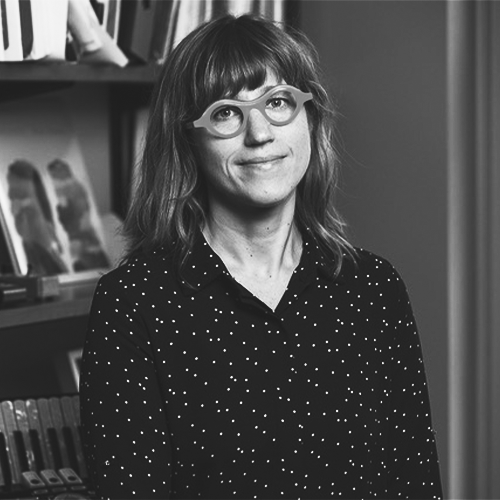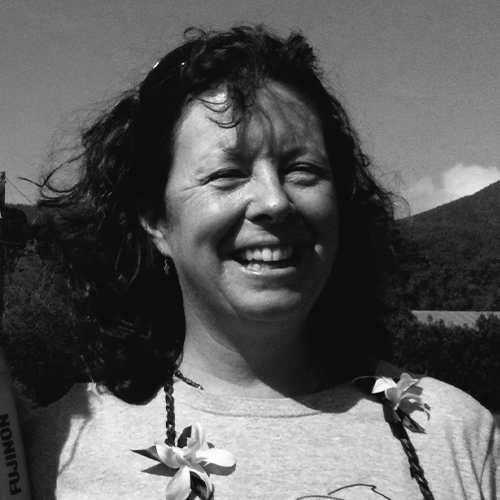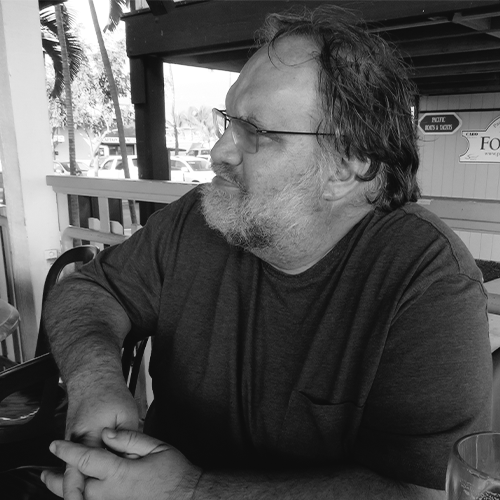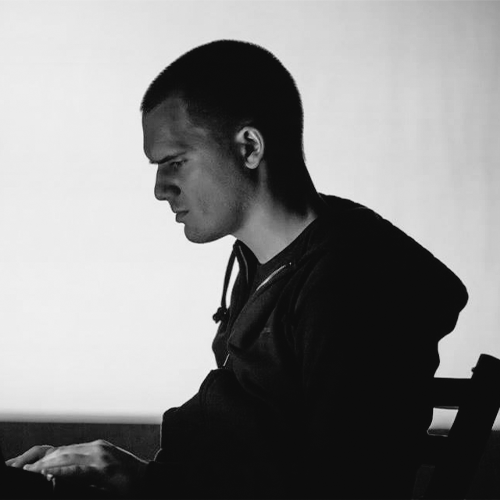Annie Lewandowski is a composer, performer, and senior lecturer in the Department of Music at Cornell University. In 2017, she began studying humpback whale song with pioneering bioacoustician Katy Payne. Ms. Lewandowski’s 2018 composition, “Cetus: Life After Life,” for humpback whale song and chimes, explores the evolution of Hawaiian humpback song from 1977-1981. She has been awarded grants from the Atkinson Center for Sustainability for her research exploring the creative minds of humpback whales and collaborated with Google Creative Lab to create the broadly adopted public web tool “Pattern Radio: Whale Songs” for teaching AI to recognize patterns in humpback whale song. Ms. Lewandowski has released ten recordings with her band Powerdove and has presented her work at festivals and venues across the United States and Europe, including the Casa da Musica (Porto, Portugal), the Hippodrome (London), the Frieze Arts Fair (London), and REDCAT (Los Angeles). She is a 2014 Civitella Ranieri Foundation Fellow.
Hawaiian Humpback Whales
Event Overview
Speakers
Chris Gabriele is a whale biologist who migrates from Alaska to spend each winter on the island of Hawai’i studying humpback whales in their breeding grounds. Ms. Gabriele is a founding member of the nonprofit Hawai’i Marine Mammal Consortium studying population trends, behavior, vocalizations, and health of humpback whales. Since 1991, she has spent summer feeding seasons as a wildlife biologist at Glacier Bay National Park, where her work focuses on the life history, behavior, and vocalizations of humpback whales, characterizing the underwater sound environment and working to minimize the risk of whale-vessel collisions. Raised in Schenectady, New York, Ms. Gabriele earned her Bachelor’s degree in Biology at Cornell University in 1984 and a Master’s degree at the University of Hawai’i in 1992. She loves living in both Alaska and Hawaii but misses rural New York for its homegrown tomatoes in the summer and fresh apples in the fall.
Adam Frankel spent his formative years in Oregon and frequently vacationed at the beach; his love for the ocean probably originated there. Dr. Frankel studied biology and completed graduate degrees in Zoology and Oceanography at the University of Hawai‘i. His research playback experiments with humpback whales and uses a small hydrophone array to passively locate and track singers. His postdoc at the Cornell Laboratory of Ornithology focused on the effect of low-frequency sound on humpback behavior and distribution. That work continues at Marine Acoustics Inc. through projects that measure whistle source levels of wild dolphins and investigate gray whale hearing. He also supports the U.S. Navy through research on whale recordings made with their ocean-basin wide array of hydrophones. In 2003, Dr. Frankel co-founded the Hawai‘i Marine Mammal Consortium (HMMC) to help foster research, education, and conservation. HMMC recently published a paper based on 19 years of data that describes the relationship between climate-dependent ocean conditions in Alaska and the number of whales in Hawaii. He has authored or co-authored dozens of articles, book chapters, and reports on whale behavior and bioacoustics. Dr. Frankel has helped teach undergraduate- and graduate-level classes and workshops on marine bioacoustics for the last 20 years.
Kyle McDonald is an artist working with code. He crafts interactive installations, sneaky interventions, playful websites, workshops, and toolkits for other artists working with code. Mr. McDonald explores the possibilities of new technologies: to understand how they affect society, to misuse them, and to build alternative futures; aiming to share a laugh, spark curiosity, create confusion, and share spaces with magical vibes. He works with machine learning, computer vision, and social and surveillance tech spanning commercial and arts spaces. Mr. McDonald was previously adjunct professor at NYU’s ITP, a member of F.A.T. Lab, the community manager for Open Frameworks, and artist-in-residence at STUDIO for Creative Inquiry at CMU and YCAM in Japan. His work has been commissioned and shown around the world, including at the V&A, NTT ICC, Ars Electronica, Sonar, Today’s Art, and Eyebeam.

Annie Lewandowski is a composer, performer, and senior lecturer in the Department of Music at Cornell University. In 2017, she began studying humpback whale song with pioneering bioacoustician Katy Payne. Ms. Lewandowski’s 2018 composition, “Cetus: Life After Life,” for humpback whale song and chimes, explores the evolution of Hawaiian humpback song from 1977-1981. She has been awarded grants from the Atkinson Center for Sustainability for her research exploring the creative minds of humpback whales and collaborated with Google Creative Lab to create the broadly adopted public web tool “Pattern Radio: Whale Songs” for teaching AI to recognize patterns in humpback whale song. Ms. Lewandowski has released ten recordings with her band Powerdove and has presented her work at festivals and venues across the United States and Europe, including the Casa da Musica (Porto, Portugal), the Hippodrome (London), the Frieze Arts Fair (London), and REDCAT (Los Angeles). She is a 2014 Civitella Ranieri Foundation Fellow.

Chris Gabriele is a whale biologist who migrates from Alaska to spend each winter on the island of Hawai’i studying humpback whales in their breeding grounds. Ms. Gabriele is a founding member of the nonprofit Hawai’i Marine Mammal Consortium studying population trends, behavior, vocalizations, and health of humpback whales. Since 1991, she has spent summer feeding seasons as a wildlife biologist at Glacier Bay National Park, where her work focuses on the life history, behavior, and vocalizations of humpback whales, characterizing the underwater sound environment and working to minimize the risk of whale-vessel collisions. Raised in Schenectady, New York, Ms. Gabriele earned her Bachelor’s degree in Biology at Cornell University in 1984 and a Master’s degree at the University of Hawai’i in 1992. She loves living in both Alaska and Hawaii but misses rural New York for its homegrown tomatoes in the summer and fresh apples in the fall.

Adam Frankel spent his formative years in Oregon and frequently vacationed at the beach; his love for the ocean probably originated there. Dr. Frankel studied biology and completed graduate degrees in Zoology and Oceanography at the University of Hawai‘i. His research playback experiments with humpback whales and uses a small hydrophone array to passively locate and track singers. His postdoc at the Cornell Laboratory of Ornithology focused on the effect of low-frequency sound on humpback behavior and distribution. That work continues at Marine Acoustics Inc. through projects that measure whistle source levels of wild dolphins and investigate gray whale hearing. He also supports the U.S. Navy through research on whale recordings made with their ocean-basin wide array of hydrophones. In 2003, Dr. Frankel co-founded the Hawai‘i Marine Mammal Consortium (HMMC) to help foster research, education, and conservation. HMMC recently published a paper based on 19 years of data that describes the relationship between climate-dependent ocean conditions in Alaska and the number of whales in Hawaii. He has authored or co-authored dozens of articles, book chapters, and reports on whale behavior and bioacoustics. Dr. Frankel has helped teach undergraduate- and graduate-level classes and workshops on marine bioacoustics for the last 20 years.

Kyle McDonald is an artist working with code. He crafts interactive installations, sneaky interventions, playful websites, workshops, and toolkits for other artists working with code. Mr. McDonald explores the possibilities of new technologies: to understand how they affect society, to misuse them, and to build alternative futures; aiming to share a laugh, spark curiosity, create confusion, and share spaces with magical vibes. He works with machine learning, computer vision, and social and surveillance tech spanning commercial and arts spaces. Mr. McDonald was previously adjunct professor at NYU’s ITP, a member of F.A.T. Lab, the community manager for Open Frameworks, and artist-in-residence at STUDIO for Creative Inquiry at CMU and YCAM in Japan. His work has been commissioned and shown around the world, including at the V&A, NTT ICC, Ars Electronica, Sonar, Today’s Art, and Eyebeam.
- View slide #1
- View slide #2
- View slide #3
- View slide #4
View Keynote by completing the form below.
You're Registered!
